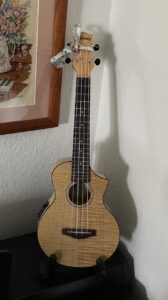
This is my Ukulele, a gift, given to me by one of my sons. It’s a beauty. I love the color, the wood grain, the feel of it in my hands, and the sound it produces. It’s wonderful to my ear.
Many people have learned to play an instrument. In my very small elementary school nearly every kid, in fifth grade, picked up an unfamiliar instrument and started the process of training their lips, fingers, ear and brain to do something entirely new that would produce sounds that they had only heard before. I was no different. I started on a trumpet, one my parents had purchased years before, and had been used by at least one other sibling in the same pursuit, to learn how to make music.
Full disclosure. I practiced minimally at home. I hated lugging the thing on the bus, and I hated even more blowing into it when I was the only one around. After only a couple of years on the trumpet my band teacher talked me into leaving the manageable size of this brass instrument for something larger, the euphonium or baritone. I loved it. The sounds were melodious, and I was one of only two in the band who attempted to gain some level of proficiency on what I affectionately, but erroneously, called the baby tuba.
When you begin playing a new instrument, much practice is needed if you want to become good at it. Initially you think a lot about how to hold it, how to blow into it, the fingering combinations that produce the desired notes, the familiarization with and look of the notes and rhythms. It’s a somewhat complicated process when you break it down. However, many aspects of it become easier and somewhat habitual the more you do it. Of course, a great deal of practice is necessary to play more complicated pieces, but its all a process of gaining a natural flow that allows you to not have to think about how every note is produced.
Several years ago, my wife gave me a beautiful guitar. I had dabbled in playing guitar throughout my life and this was an opportunity to build on the minimal skills I had acquired over the years. I would pick it up in fits and starts, but never enough to really grow proficient with the instrument. I found I could easily make any excuse to not consistently practice, rather than picking up the guitar and training myself to play it. Although a marginally good musician, I’m one that must work on it constantly and consistently to really have some level of proficiency and I didn’t overcome the thoughts and behaviors that got in the way of my practice. Change is hard for everyone. I’m no exception.
Luckily, somewhat by happenstance, into my life came the ukulele. I was fortunate to have the opportunity to be stationed in Hawaii for three years by the Air Force, and this is where I grew to love ukulele music. I purchased a rather inexpensive one and learned some notes and fingering and found the ukulele was several degrees easier for me to play than the guitar. I saw progress in being able to play and make the kind of music I desired much easier than I had been able to with the guitar, which motivated me to do more of it, thus creating a positive pattern of practice that obviously led to greater proficiency on the instrument.
Now I’m no Israel Kamakawiwo’ole by any stretch, but I can strum and sing and although performing for anyone is not in my future, I am enjoying the time I spend in learning and the personal growth of the change of gaining a new skill. This tool has also often helped me deal with stress and worries of the day, offering me a benefit I never really considered when I started playing.
Change, although often hard, can build on itself, become reinforcing and somewhat easier to do especially when you see positive outcomes. The difficulty can often be negated by the benefits. Discouragement, procrastination and other negative thoughts and feelings, which can get in the way of making lasting change sometimes seem insurmountable. Next week I’ll give you an idea or two that can help with those thoughts and feelings.
